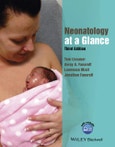Neonatology at a Glance provides a concise, illustrated overview of neonatal medicine. Written by leading international experts, it provides essential information on perinatal medicine, delivery, the normal newborn infant and neonatal problems encountered in neonatal intensive care units and their management.
Each topic is supported by excellent illustrations, diagrams, and, for the first time, video clips to show neonatal resuscitation and stabilizing the sick newborn, normal examination, the baby with hypoxic–ischemic encephalopathy, recognition of seizures and practical procedures.
Neonatology at a Glance:
Provides up to date coverage of the important conditions you will encounter
Covers challenging topics including pain, ethical issues, quality improvement, evidence based medicine and palliative care
Features new sections on fetal medicine, respiratory support, therapeutic hypothermia, amplified EEG and perinatal neuroimaging
Integrates invaluable details about practical procedures including neonatal resuscitation and transport
Supplemented by video materials and artwork which can be viewed via the companion website at [external URL]
Neonatology at a Glance is the perfect guide for all health professionals looking after newborn infants, including pediatric trainees, medical students, neonatal nurse practitioners and neonatal nurses, therapists and midwives. For neonatologists, pediatricians and nurse tutors it is a valuable resource to assist with teaching.
Table of Contents
Preface vii
Contributors viii
How to use this textbook xi
About the companion website xiv
Part 1 Introduction
1 Milestones in neonatology 2
2 Epidemiology 4
Part 2 Perinatal medicine
3 Perinatal medicine 6
4 Prepregnancy care, prenatal screening and fetal medicine 8
5 Maternal medical conditions 10
6 Intrauterine growth restriction 12
7 Multiple births 14
8 Preterm delivery 16
9 Birth defects and genetic disorders 18
10 Maternal drugs affecting the fetus and newborn infant 20
11 Congenital infection 22
Part 3 Delivery
12 Adaptation to extrauterine life 26
13 Neonatal resuscitation and post–resuscitation care 28
14 Hypoxic ischemic encephalopathy 34
15 Birth injuries 38
Part 4 The normal newborn infant
16 Routine care of the newborn infant 40
17 Routine examination of the newborn infant 42
18 Neurologic examination 44
19 Care and support for parents 46
20 Feeding 48
21 Minor abnormalities in the first few days 50
22 Common problems of term infants 52
Part 5 The sick newborn infant
23 Admission to the neonatal unit 54
24 Developmental care 56
25 Stabilizing the sick newborn infant 58
26 Respiratory support 60
Part 6 The preterm infant
27 Preterm infants and their complications 66
28 Lung development and surfactant 68
29 Respiratory distress syndrome 70
30 Temperature control 72
31 Growth and nutrition 74
32 Intraventricular hemorrhage and periventricular leukomalacia 76
33 Patent ductus arteriosus (PDA) 78
34 Infection, jaundice, anemia, osteopenia of prematurity 80
35 Apnea, bradycardia and desaturations, retinopathy of prematurity 82
36 Necrotizing enterocolitis 84
37 Bronchopulmonary dysplasia 86
38 Outcome of preterm infants 88
Part 7 Neonatal problems
39 Respiratory distress in term infants 90
40 Upper airway disorders 94
41 Jaundice 96
42 Neonatal infection 100
43 Specific bacterial infections 102
44 Viral infections 104
45 Hypoglycemia and hyperglycemia 106
46 Inborn errors of metabolism 108
47 Gastrointestinal disorders 110
48 Gastrointestinal obstruction 114
49 Cardiac disorders 116
50 Renal and urinary tract anomalies diagnosed prenatally 120
51 Renal and urinary tract disorders 122
52 Genital disorders 126
53 Disorders of sex development 128
54 Anemia and polycythemia 130
55 Neutrophil and thrombotic disorders 132
56 Coagulation disorders 134
57 Dermatological disorders 136
58 Seizures and perinatal strokes 138
59 Neural tube defects and hydrocephalus 140
60 The hypotonic infant 142
61 Bone and joint disorders 144
62 Hearing and vision 146
Part 8 Aspects of neonatal intensive care
63 Pain 148
64 Pharmacology 150
65 Quality improvement 152
66 Critical incidents 154
67 Evidence ]based medicine 158
68 Ethics 160
69 Research and consent 162
70 Palliative and end ]of ]life care 164
71 Discharge from hospital 166
72 Follow ]up of high ]risk infants 168
Part 9 Global
73 Global neonatology 170
Part 10 Transport
74 Transport of the sick newborn infant 174
Part 11 Practical procedures
75 Intubation and chest tubes 176
76 Common practical procedures 178
77 Umbilical catheters and intraosseous cannulation 180
78 Central venous catheters and exchange transfusions 182
79 Cranial ultrasound 184
80 Amplitude ]integrated electroencephalography (aEEG) 188
81 Perinatal neuroimaging 190
82 Echocardiography for the neonatologist 192
83 Gestational age assessment, BP, severity of illness scores, jaundice treatment chart 194
Index 196








